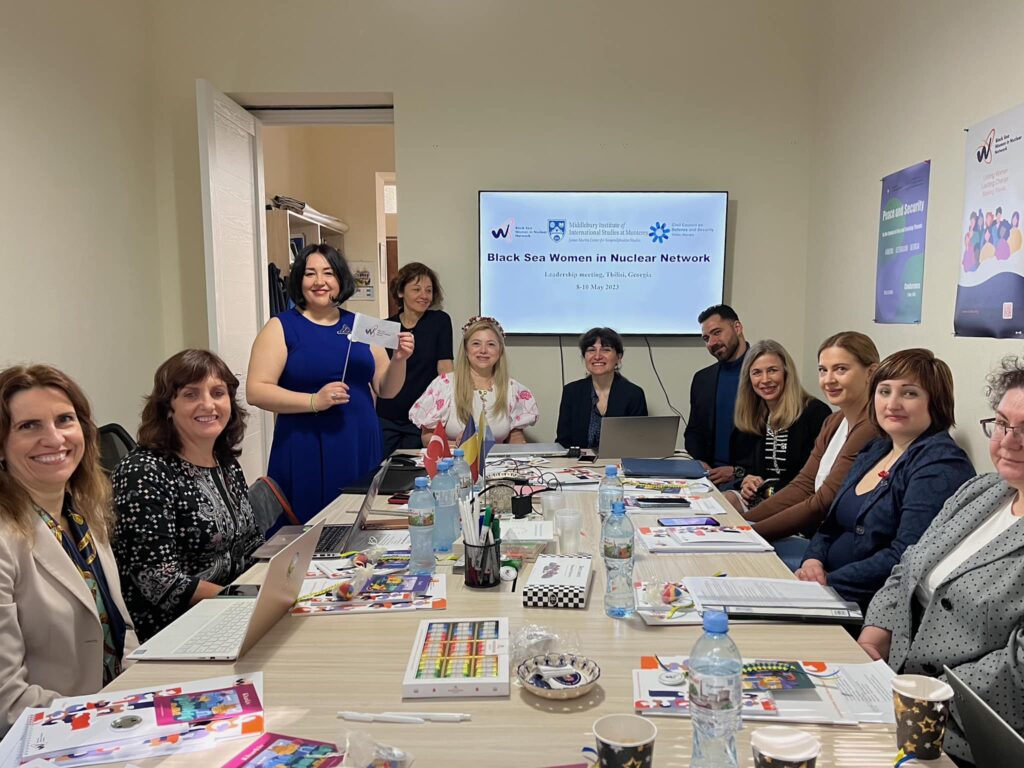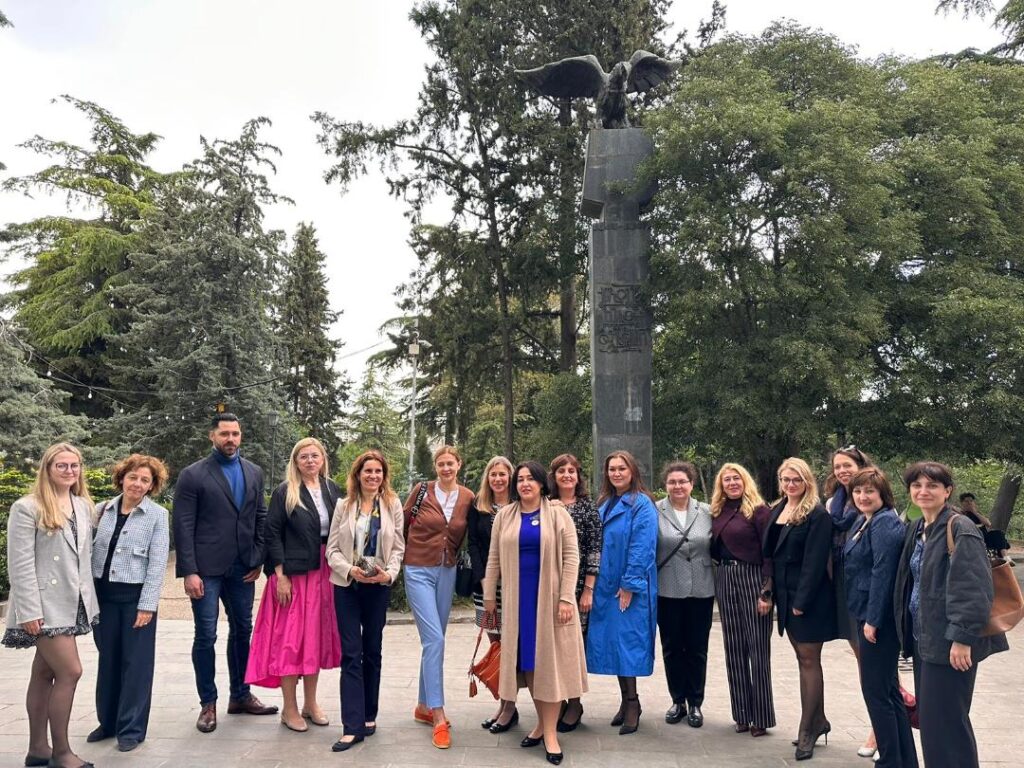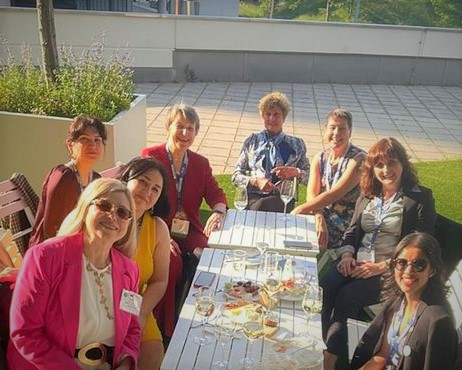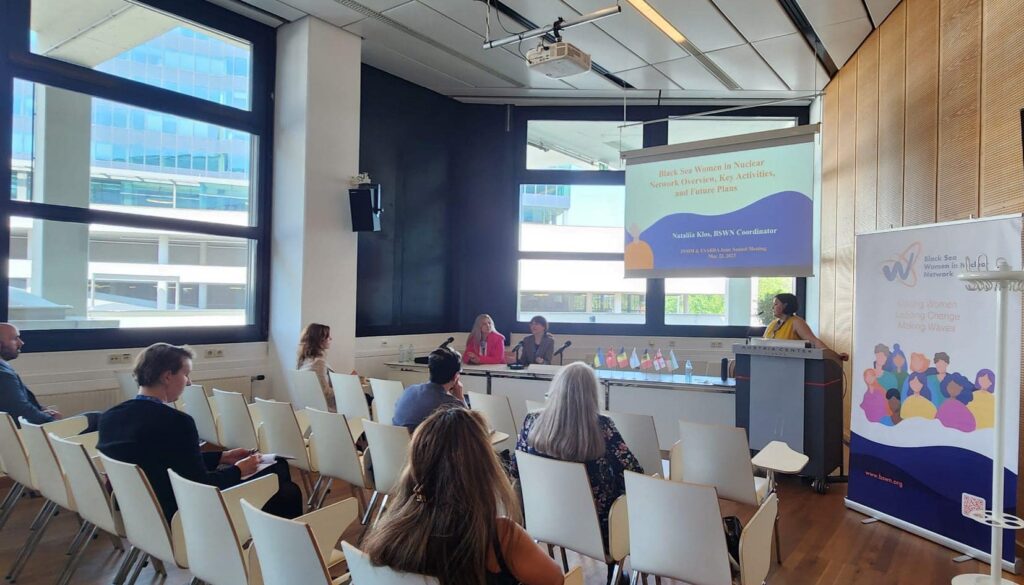June 5, 2023
Margarita Kalinina-Pohl and Adeline duCrest
Last month buzzed with activities for the Black Sea Women in Nuclear Network (BSWN) and its founder Margarita Kalinina-Pohl with two appearances in Tbilisi and Vienna to discuss the future of the network, to promote it to various regional and international stakeholders, and to participate in panel discussions on DEIA (diversity, equity, inclusion, and accessibility) and nuclear security matters.
BSWN Leadership Meeting
On May 8-9, the BSWN leadership, communications team, and country points of contact gathered in Tbilisi, Georgia, to discuss the future development of the network, its sustainability, and communications strategies. The working-level meeting was hosted by the Civil Council for Defense Security (CCDS) co-founded by former CNS Visiting Fellow Tamara Pataraia (’98). The meeting included over 20 participants responsible for the network’s management, communications, and promotion. The meeting’s agenda focused on practical steps to make the network a more sustainable entity and to review its mentorship program as one of the network’s emerging flagship activities.
The first day was devoted to the discussion of the network’s structure, statute, and mentorship program. Nataliia Klos (CNS Visiting Fellow ’10), BSWN Coordinator, began the meeting with an overview of potential next steps for developments of BSWN. Since last year, BSWN has significantly expanded its membership and activities, and has been increasingly recognized as a professional network in various regional and international fora. The leadership team was therefore invited to consider how to further advance the network, including potentially registering as a non-profit, non-commercial, non-partisan organization.
Nataliia then presented the results of the survey sent to BSWN members on the future of the network. The discussion that followed centered around mentorship and inter-generational inclusion, concerning not only the younger generation, but also the older former Soviet generation. Programs to support mid-career experts were also suggested, including English language courses on non-proliferation and arms control vocabulary.
Expanding on the conversation around mentorship, Madalina Stefanic, BSWN Mentorship Program Coordinator, presented updates on the BSWN mentorship initiative, sharing available mentors and topics. Details of the initiative, including advertising the program, hosting virtual or in-person meetings, and offering different languages, were discussed.
This session also featured a virtual presentation by Federica Dall’Arche, senior researcher from the Vienna Center for Disarmament and Nonproliferation (VCDNP). Federica shared VCDNP’s Young Women and Next Generation Initiative and provided advice on starting mentorship programs.
The first day concluded with the remarks by Taylor Hart-McGonigle from the Department of Energy (DOE) National Nuclear Security Administration’s (NNSA) Nuclear Security Women Initiative (NSW).
The second day focused on communication strategy, BSWN website content development, BSWN partnerships, fundraising strategies, as well as BSWN current and future key activities. Speakers presented on BSWN’s potential communication strategy, the importance of BSWN’s active presence on social media, and the development of a website that is both functional and easy to navigate. Participants discussed potential BSWN partners and were encouraged to think about organizations in their own countries that could represent potential partners.
Considering the future need to request financial support from other organizations, the importance of writing proper grant proposals was underlined, as well as development of other professional skills, such as public speaking. Participants suggested that members could benefit from targeted webinars on these topics.
To conclude the leadership meeting, participants brainstormed future BSWN activities, including engaging youth and children and conducting joint regional research projects on gender parity in the nuclear field and nuclear security regional architecture.
The meeting was organized by CNS and CCDS in collaboration with the Los Alamos National Laboratory with support from the U.S. Department of Energy’s National Nuclear Security Administration and the Swedish Radiation Safety Authority.
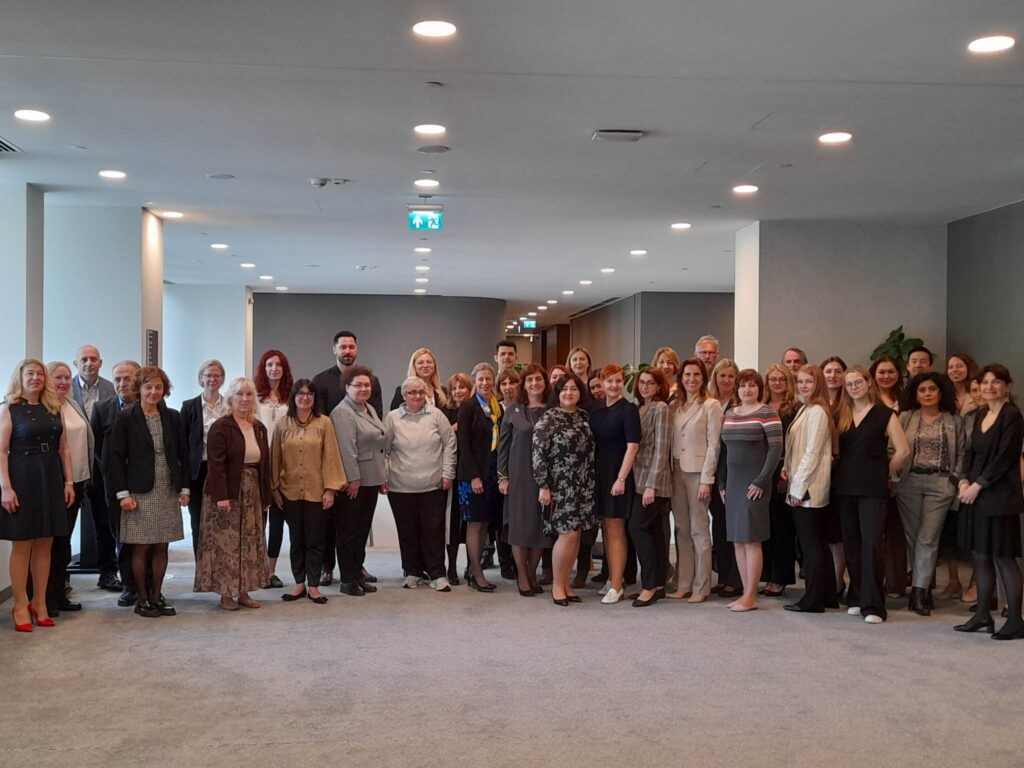
Participants of the BSWN Leadership and U.S.-Black Sea Nonproliferation Professionals Exchange Joint Meeting
Joint BSWN-U.S.-Black Sea Nonproliferation Professionals Exchange Meeting
Following the leadership meeting, BSWN representatives took part in a joint event organized by CCDS for BSWN and the US-Black Sea Nonproliferation Professionals Exchange on May 10. This event brought together two groups established by CNS and comprised of a diverse assembly of experts from Bulgaria, Georgia, Moldova, Romania, Türkiye, and Ukraine. Several key stakeholders from Georgia participated in the meeting, including representatives from the Office of the President of Georgia, the Ministry of Foreign Affairs, the Ministry of Interior, research and academic institutions, private foundations, and civil society. International participants included U.S. EXBS Office, Defense Threat Reduction Agency (DTRA), Scientific and TCU (Georgia office), Global Affairs Canada, INTERPOL, European Nuclear Education Network (ENEN), and Stimson Center which joined remotely.
The meeting’s program featured a presentation of the BSWN progress report by Nataliia Klos and another prominent BSWN activity – Black Sea NucTalk led by Valeriia Gergieva (CNS Visiting Fellow ’19). The NucTalk’s topic was “CBRN Security in Light of Disinformation, Misinformation, and Fake News” and it included a panel of experts from Bulgaria, Georgia, and Ukraine. Both the report and the NucTalk were a compelling introduction of the BSWN network to various regional and international stakeholders who were not yet familiar with its activities. During this meeting, all BSWN members were invited to share their experiences of being part of the network and how it has helped them both professionally and personally. This was a great opportunity to showcase the network and its impact on the Black Sea expert community.
BSWN at the INMM/ESARDA Annual Meeting
On May 22-26, the BSWN leadership team, including Nataliia Klos, Shorena Lortkipanidze, and Madalina Stefanic, as well as Margarita Kalinina-Pohl, took part in the annual joint INMM/ESARDA meeting in Vienna, Austria to promote the network and speak at various sessions and panels. The week started with the BSWN Lunch and Learn activity organized by CNS. Moderated by Margarita Kalinina-Pohl, the activity focused on the presentation of the network by BSWN leaders to a group of over 25 attendees including various U.S. and other national government agencies, laboratories, universities, and NGOs. This activity, advantageously scheduled on the first day of the week-long meeting, was a remarkable initiation of the network to the INMM community and it led to several promising opportunities for future collaboration.
Together with representatives from Los Alamos National Laboratory (LANL), Oak Ridge National Laboratory (ORNL), Purdue University, CNS, and MIIS, BSWN members participated in the panel that was co-hosted by the U.S. Department of Energy’s National Nuclear Security Administration’s Office of Global Material Security Nuclear Security Women Program CNS/MIIS, and INMM Diversity, Equity, Inclusion and Accessibility (DEIA) Committee. The panel was moderated by Rhonda Evans (WINS) and focused on diversity and inclusion initiatives in nuclear security and sharing experiences from NGOs, U.S. national laboratories, academic institutions, and other international organizations. The panelists shared their experiences with achieving gender balance in nuclear fields, in leadership positions, implementing diversity and inclusion efforts, and associated challenges, opportunities, and benefits. There was a specific focus on nuclear security practitioners and the current landscape in this area. The panel discussion included specific recommendations from the panelists for the path forward in enhancing diversity and inclusion in the nuclear sector. BSWN member Shorena Lortkipanidze took part in another Diversity and Inclusion Panel where she presented a paper titled “Advancing Women in Nuclear Fields Through Regional Engagements” that she co-authored with Olga Martin and Margarita Kalinina-Pohl.
In addition to activities dedicated to DEIA matters, Margarita also took part in a technical session where she presented findings of the recently published CNS report “Radiological Security in Contested Territories: The Successful Case of the Removal of Disused Radioactive Sources and Materials from Transdniestria.”
It was the first in-person appearance of the BSWN network at the INMM annual meeting thanks to the support from U.S. DOE NNSA. This was an outstanding platform to advance the network to the next level professionally and receive recognition within INNM/ESARDA communities and WiN Global, as a strong nuclear women-led entity from the Black Sea region with powerful and competent leadership.

